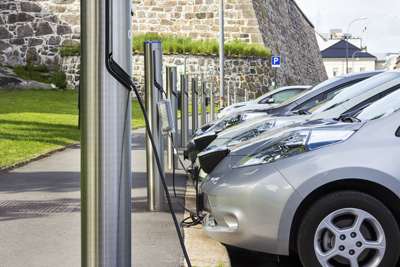Five of six New England states have earned praise through a new report examining electric vehicles and charging infrastructure.
Massachusetts led the way in the American Council for an Energy-Efficient Economy’s report “2023 State Transportation Electrification Scorecard,” just edging out Vermont in the newest rankings.
“We are seeing incremental progress, not transformational progress,” Peter Huether, senior research analyst and lead author of the report, said in a statement. “States will have to move far more aggressively to do their part to enable the electric vehicle transition that the climate crisis demands. Auto manufacturers are expanding their EV options and consumers are increasingly choosing them, but supportive state policies are needed to ensure that the electric grid is ready and that all households and businesses, including those in underserved communities, can use EVs and have adequate access to charging.”
The Bay State, fourth in the nation, scored 57.5 out of a total of 100 possible points in the report. Vermont came in fifth with 57 points, while Maine came in 11th with 43.5 points. Connecticut earned a score of 42.5 and Rhode Island came in 19th with 29.5 points. New Hampshire did not register a score in the analysis.
According to the report, 28% of greenhouse gases stem from the transportation sector, with electric vehicles playing a key role in reducing emissions. But, only 7% of the vehicle market features new electric vehicles as states possess the power to remove barriers to adoption of electric vehicles and support the market.
Massachusetts, according to the report, secured its ranking by offering a wide range of incentives for electric vehicles and charging infrastructure. Plus, there is a considerable investment in utilities in charging infrastructure, including for low-income, economically distressed and EJ communities. The state has low or no fees for electric vehicles, in addition to nonfinancial incentives for those vehicles.
Massachusetts garnered 10 points for planning and goals; 21.5 points for incentives; 8.5 points for system efficiency; six points for grid optimization; 11.5 points for outcomes to earn a score of 57.5.
Vermont, according to the report, came in fifth and has a strong per capita charging infrastructure deployment and light-duty and heavy-duty EV registrations. The state scored 12 points on planning and goals; 14 points for incentives; 5.5 points for system efficiency; 7 points for grid optimization; 18.5 points for outcomes for an overall score of 57.
According to the report, Maine earned five points for planning and goals; 16 points for incentives; four points for efficiency; seven points for optimization; and 11.5 points for outcomes.
Connecticut, according to the report, earned 6.5 points for planning and goals; 17 points for incentives; eight points for system efficiency; five points for grid optimization; and six points for outcomes.
Rhode Island, according to the report, garnered four points for planning and goals; 11.5 points for efficiency; 1.5 points for system efficiency; 2 points for grid optimization; and 10.5 points for outcomes.
New Hampshire was unranked in the report, and the authors said the state has work to do to plan for and accelerate transportation electrification and engage in comprehensive planning to define a coordinated strategy to build out electrified transportation.













